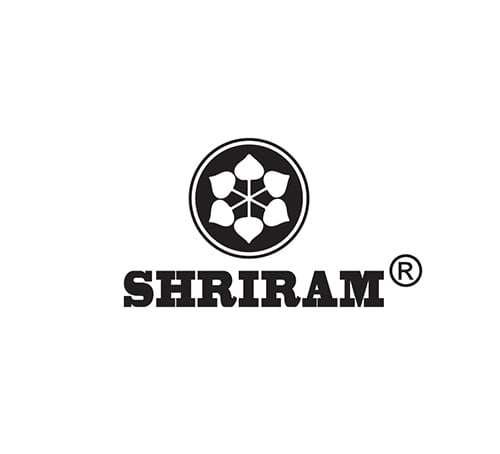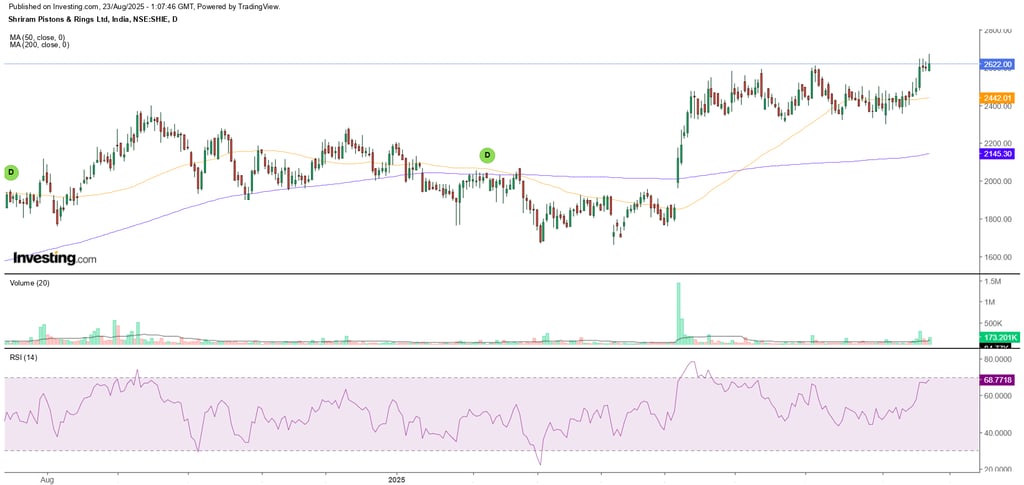Shriram Pistons & Rings
Fundamental & Technical Analysis of Shriram Piston & Rings
STOCK ANALYSIS
8/22/20255 min read


About Company
Shriram Pistons & Rings Limited is a well-known Indian company that makes important engine parts such as pistons, piston pins, piston rings, and engine valves. These parts are essential components in vehicles like cars, motorcycles, trucks, and agricultural machines. The company has a strong history of over 50 years and is recognized for its quality and reliability. Their products are used by many leading vehicle makers in India and abroad, including big names like Ashok Leyland, Bajaj Auto, Hero MotoCorp, Honda, Hyundai, Mahindra, Maruti Suzuki, Tata Motors, and Royal Enfield. Shriram Pistons & Rings not only serves the domestic market but also exports to many countries. The company offers end-to-end solutions, including designing, developing, testing, and manufacturing these engine components, making it a key player in the automotive industry. Their brands, SPR and USHA, are trusted for delivering durable and high-performance engine parts. The company operates with a strong focus on customer satisfaction and continuous improvement in quality and technology. It has also received various awards for excellence in quality management and production standards.
Business Segments
The company primarily operates in the automotive components sector, producing key engine components such as pistons, piston rings, piston pins, and engine valves. Its business segments include manufacturing components for a wide range of vehicles, including two-wheelers, passenger cars, commercial vehicles, and agricultural machinery. The company also focuses on exports, supplying quality engine parts to international markets. Recently, it has expanded into electric vehicle (EV) components, reflecting its move toward future mobility solutions. Additionally, through its subsidiaries, Shriram Pistons is involved in precision engineering and manufacturing services, enhancing its product range and technological capabilities to serve diverse industrial needs. This diversified approach helps the company maintain a strong position in both traditional and emerging automotive markets.
Company's Facilities
The company has a network of advanced manufacturing facilities across India, with major plants located in Ghaziabad (Uttar Pradesh), Pathredi (Rajasthan), and Pithampur (Madhya Pradesh). These facilities are equipped with state-of-the-art machinery and automation technologies from global leaders to produce high-quality engine components like pistons, rings, and valves. The company uses robotic pouring, precision machining, advanced inspection systems, and specialized coating processes to ensure top-notch product quality and consistency. It also operates a comprehensive tech centre and R&D labs in New Delhi for product development, simulation, and rigorous testing. With over 9,000 employees, Shriram Pistons’ infrastructure enables large-scale manufacturing, innovation, and swift delivery to both Indian and international customers.
Production Capacity
The company has a substantial production capacity that enables it to meet the demands of a wide range of automotive manufacturers in India and abroad. Its manufacturing units are designed to produce millions of engine components annually, including pistons, rings, pins, and valves. The company continuously invests in modern machinery and automation to enhance efficiency and scale up production. This robust capacity allows Shriram Pistons to supply components for various vehicle types, such as two-wheelers, passenger cars, commercial vehicles, and agricultural equipment. With the addition of new facilities focused on electric vehicle parts, the company is also expanding its production capabilities to cater to emerging market needs, ensuring it remains a key supplier in the evolving automotive sector.
Future Plans
Shriram Pistons & Rings is focused on expanding its presence in the growing electric vehicle (EV) market by setting up dedicated manufacturing facilities for EV components, aiming to be a key player in this emerging sector. The company plans to enhance its technological capabilities through continuous research and development, improve production efficiency with advanced automation, and explore strategic acquisitions to strengthen its product portfolio. Additionally, Shriram Pistons aims to increase its export footprint to global markets while maintaining strong relationships with major Indian automotive manufacturers. This future-oriented approach reflects the company’s commitment to innovation, sustainability, and long-term growth in both traditional and new mobility segments.
Financial Prospects of The Company
Market Valuation & Stock Price
The company has a market valuation of 11,550 crores, and the stock price is 2,622
Price-to-Earnings Ratio (P/E Ratio)
The price-to-earnings ratio of the company is 22.0
Book Value (PB Ratio)
The book value of the company is 543
Price to Book Value (PE x PB)
The price-to-book value of the company is 106
Earnings Per Share (EPS)
The earnings per share of the company are 119
Return Ratios
The return on capital employed (ROCE) is 25.7% and the return on capital employed (ROE) is 23.2%
Dividend Yield
The dividend yield of the company is 0.38%
Sales & Profit in The Last 5 Years
In FY 2020-21, the sales were 1,597 crores and profits were 89 crores. In FY 2021-22, sales were 2,065 crores and profits were 164 crores. In FY 2022-23, sales were 2,609 crores and profits were 294 crores. In FY 2023-24, sales were 3,089 crores and profits were 439 crores. In FY 2024-25, sales were 3,550 crores and profits were 516 crores.
Sales & Profit Growth in The Last 5 Years
In the last 5 years, sales growth was 17.2% and profit growth was 47.8%. In the last 3 years, sales growth was 19.8% and profit growth was 45.7%. In the last 1 year, sales growth was 14.5% and profit growth was 15.1%.
Investors
Shareholding Patterns
The promoters hold 43.75%, FIIs hold 5.88%, DIIs hold 13.34% and Public hold 37.02%
Company News
Shriram Pistons & Rings Ltd recently reported strong financial performance for the first quarter of FY26, showcasing a 15% growth in profit after tax (PAT) and an expansion in profit margins. The company is actively expanding its market reach, including setting up a new electric vehicle (EV) plant expected to be operational by September 2025. This move reflects its commitment to evolving with the growing EV industry and diversifying its product offerings.
In addition, Shriram Pistons is engaged in strategic acquisitions to strengthen its position. Notably, through its subsidiary SPR Engenious Limited, the company is acquiring a 75% stake in Takahata Precision India Pvt. Ltd., a key player in precision engineering, which will bolster its manufacturing capabilities.
The company continues to grow steadily in domestic and export markets, maintaining a solid presence in the automotive components sector. Its stock has shown positive momentum recently, with a market capitalization exceeding Rs 11,400 crore and steady share price gains over the past year.
Technical Analysis
Company Chart


Moving Average (MA)
The stock is trading above the 50-MA, which indicates that it is in a bullish trend.
The stock is trading above the 200-MA, which also indicates that it is in a bullish trend.
Chart Patterns
The chart patterns show that the stock is in a strong bullish trend.
Relative Strength Index (RSI)
Currently, the RSI of the stock is 68, which indicates that the stock is near the overbought zone.
Strengths & Weaknesses
Strengths
Strong relationships with leading vehicle manufacturers in India and abroad
Diverse product range covering pistons, rings, pins, valves, and expanding into EV components
Advanced manufacturing facilities with modern technology and automation
Robust research and development capabilities supporting innovation and quality
Growing presence in export markets, enhancing global reach
Strategic acquisitions strengthening manufacturing and precision engineering skills
Financially stable with steady profit growth and a sound market position
Weaknesses
Heavy reliance on the automotive sector, which is cyclical and impacted by economic fluctuations
Competition from larger multinational automotive component suppliers
Dependency on the Indian market for a significant portion of revenue
Transition challenges related to scaling up EV component production and market acceptance
Vulnerability to raw material price fluctuations affecting manufacturing costs
